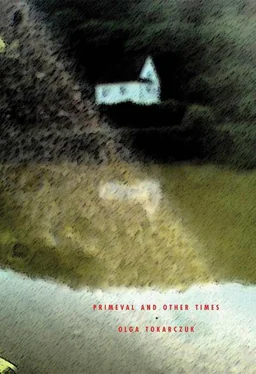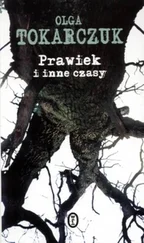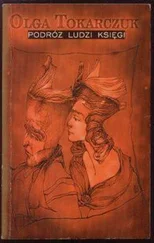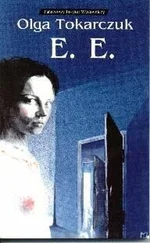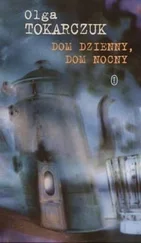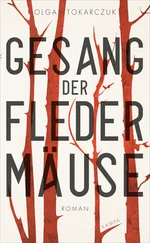This went on for several months, until an instinct awoke in him, and Izydor decided to save himself. When he appeared in the kitchen for the first time, Misia burst into tears and spent a long time hugging him to her apron smelling of dinner.
“You smell like Mama,” he said.
Now once a day he slowly came down the narrow stairs and absent-mindedly put more twigs on the fire. Misia always had some milk boiling, or some soup, and the safe, familiar smell brought the rejected, empty world back to him. He would fetch himself something to eat and go back upstairs, muttering.
“You could chop some wood,” Misia would call after him.
He chopped wood thankfully, filling the entire woodshed with logs for the fire.
“You could stop chopping wood,” fumed Misia.
So he took Ivan’s binoculars out of their box, and from his four windows he surveyed the whole of Primeval. He looked to the east and saw the houses of Taszów on the horizon, and in front of them the woods and meadows by the White River. He saw Mrs Niechcial, who lived in Florentynka’s house, milking her cows in the meadow.
He looked to the south, at Saint Roch’s chapel and the dairy, and the bridge to town, and a car that had lost its way, and the postman. Then he went across to the west window, where he had a view of Jeszkotle, the Black River, the manor-house roof, the church towers and the ever growing old people’s home. Finally he went to the north-facing window and savoured the stretches of forest that were bisected by the ribbon of the Kielce road. He saw these same landscapes at each season of the year – snowy in winter, green in spring, colourful in summer, and faded in autumn.
That was when Izydor discovered that most of the things that matter in the world come in fours. He took a sheet of brown parcel paper and drew a table in pencil. The table had four columns. In the first row Izydor wrote:
West North East South.
And right after that he added:
Winter Spring Summer Autumn.
And he felt as if he had put down the first few words of an extremely important phrase.
This phrase must have had immense power, because now all Izydor’s senses were focused on tracking down things in fours. He sought them in his attic room, but also in the garden when he was told to weed the cucumbers. He found them in everyday jobs, in objects, in his habits, and in the folk tales he remembered from childhood. He could feel himself recovering, coming out of the undergrowth onto a straight road. Wasn’t everything starting to become clear? Didn’t he just have to put his mind to it a bit to recognise the order that was right before his eyes, if he only bothered to look?
He started going to the local library again, and borrowed whole bagfuls of books, because he realised that lots of things in fours had already been recorded.
In the library there were many books with Squire Popielski’s beautiful bookplates – above a heap of stones rose a bird with outspread wings, quite like an eagle. The bird’s claws were resting on the letters FENIX. Above the bird ran the inscription: “Ex libris Felix Popielski.”
Izydor borrowed nothing but books with the FENIX, and this sign became the hallmark of a good book. Unfortunately, he soon realised that the entire collection of books only began at L. On none of the shelves did he find authors with surnames from A to K. So he read Lao-tzu, Leibniz, Lenin, Loyola, Lucian, Martial, Marx, Meyrink, Mickiewicz, Nietszche, Origenes, Paracelsus, Parmenides, Plato, Plotinus, Poe, Porfirius, Prus, Quevedo, Rousseau, Schiller, Shakespeare, Sienkiewicz, Slowacki, Spencer, Spinoza, Suetonius, Swedenborg, Towiański, Tacitus, Tertulian, Saint Thomas Aquinas, Verne, Virgil, and Voltaire. And the more he read, the more he missed the authors from A to K: Augustine, Andersen, Aristotle, Avicenna, Blake, Chesterton, Clement, Dante, Darwin, Diogenes Laertius, Eckhart, Eriugen, Euclid, Freud, Goethe, the Brothers Grimm, Heine, Hegel, Hoffmann, Homer, Hölderlin, Hugo, and Jung. He also read an encyclopaedia at home, though it made him no wiser or better. But he did have more and more to write down in his tables.
Some foursomes were obvious – he only had to be observant:
Sour Sweet Bitter Salty,
or:
Roots Stem Flower Fruit,
or:
Green Red Blue Yellow,
or:
Left Up Right Down.
And also:
Eye Ear Nose Mouth.
He found lots of these things in fours in the Bible. Some of them seemed more primitive, older, and these gave rise to others. He felt as if before his very eyes the foursomes were multiplying and duplicating into infinity. Finally he began to suspect that infinity itself must be fourfold, like the name of God:
Y H W H
The four prophets of the Old Testament:
Isaiah Jeremiah Ezekiel Daniel.
The four rivers of Eden:
Pison Gihon Tigris Euphrates.
The faces of the cherubim:
Man Lion Ox Eagle.
The four Evangelists:
Matthew Mark Luke John.
The four cardinal virtues:
Courage Justice Prudence Restraint.
The four horsemen of the Apocalypse:
Conquest Murder Famine Death.
The four elements according to Aristotle:
Earth Water Air Fire.
The four aspects of consciousness:
Perception Sensation Thought Intuition.
The four kingdoms in the Kabbalah:
Mineral Plant Animal Human.
The four aspects of time:
Space Past Present Future.
The four alchemic ingredients:
Salt Sulphur Nitrogen Mercury.
The four alchemic processes:
Coagulatio Solutio Sublimatio Calcinatio.
The four letters of the holy syllable:
A O U M.
The four kabbalistic sephirot:
Mercy Beauty Strength Rule.
The four states of existence:
Life Dying and death The time after death Rebirth.
The four states of consciousness:
Lethargy Deep sleep Shallow sleep Waking.
The four qualities of creation:
Permanence Fluidity Volatility Light.
The four human capacities according to Galen:
Physical Aesthetic Intellectual Moral and spiritual.
The four basic operations of algebra:
Addition Subtraction Multiplication Division.
The four dimensions:
Width Length Height Time.
The four states of concentration:
Solid Liquid Gas Plasma.
The four bases that construct DNA:
T A G C
The four humours according to Hippocrates:
Phlegmatic Melancholic Sanguine Choleric.
And still the list was not complete. It could never be complete, because then the world would end. So thought Izydor. He also thought he had come upon the trail of an order that is in force throughout the universe, a special divine alphabet.
With time, tracking down things in fours changed Izydor’s mind. In every single thing, in even the most insignificant phenomenon he saw four parts, four stages, four processes. He saw foursomes following on from one another, multiplying into eights and sixteens, the constant transformation of the fourfold algebra of life. The blossoming apple tree in the orchard no longer existed for him, but a fourfold, cohesive structure consisting of roots, trunk, leaves, and flowers. And, curiously – the foursome was immortal – in autumn instead of flowers there were fruits. Izydor had to think hard about the fact that in winter only the trunk and roots were left. He discovered the law of reducibility of foursomes to twosomes – the twosome is a period of rest for the foursome. The foursome became a twosome when it was asleep, like a tree in winter.
Читать дальше
